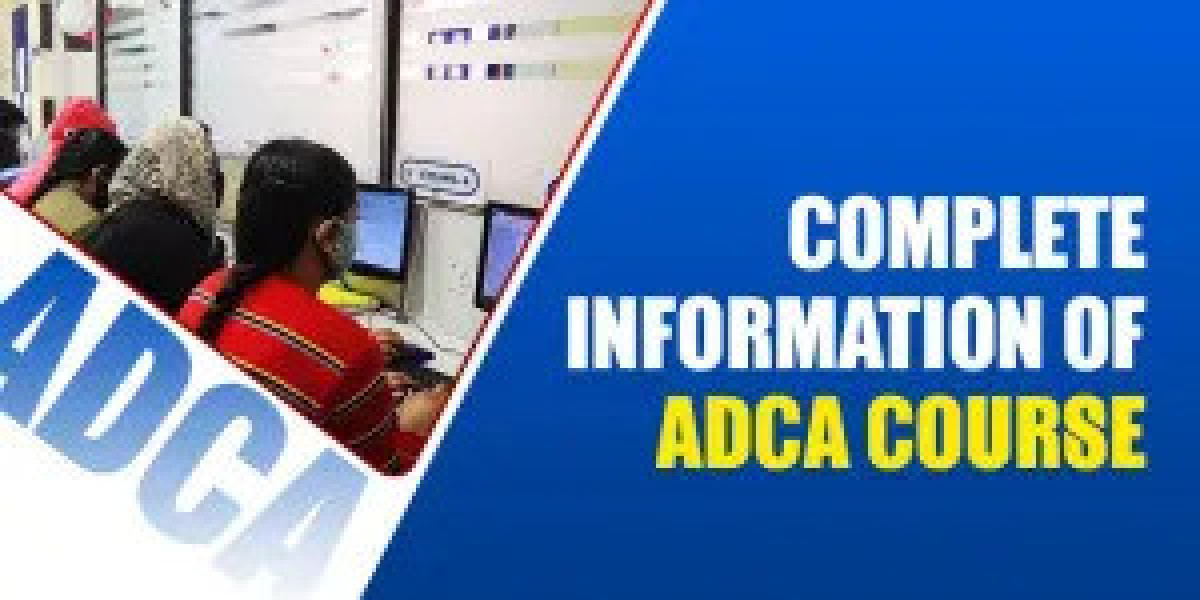In today's digital-driven world, computer literacy has become essential for personal, educational, and professional growth. One of the most popular and accessible ways to gain foundational knowledge in computer applications is through the ADCA course. ADCA (Advanced Diploma in Computer Applications) is a comprehensive program that equips students with practical skills and theoretical knowledge in various computer applications. This course covers a wide range of topics, from basic computer operations to advanced software skills, making it highly valuable for students and professionals alike. If you're considering enrolling in an ADCA Course In Patna, this guide will help you understand the syllabus, benefits, career prospects, and everything else you need to know.
What is the ADCA Course?
The ADCA course is a diploma program designed to provide advanced knowledge of computer applications and essential IT skills. This course is typically targeted toward beginners and intermediate learners, covering a range of topics from basic computer operations to software programming and internet applications. The ADCA course is ideal for students who want to build a strong foundation in computers and for professionals who wish to enhance their computer skills.
Offered by various educational institutes, including the ADCA Course in Patna, this diploma has become increasingly popular due to its relevance in today’s job market and its affordability compared to other computer science degrees. It’s generally a 12-month course, though the duration may vary depending on the institution and format (online or offline).
Syllabus of the ADCA Course
The ADCA course covers a diverse range of topics to ensure students receive well-rounded training. Here’s an overview of the core modules typically included in the ADCA syllabus:
1. Fundamentals of Computers
Introduction to computer systems
Types of computers and components
Understanding operating systems
Basic software and hardware components
2. Office Applications
Microsoft Word: Document creation and editing, formatting, templates
Microsoft Excel: Data entry, formulas, functions, and chart creation
Microsoft PowerPoint: Designing presentations, animations, transitions
Microsoft Access: Database management and query creation
3. Internet and Web Technology
Introduction to the internet and web browsers
Basics of email and online communication
Understanding cloud storage and file-sharing tools
Fundamentals of HTML and CSS for basic website development
4. Programming Languages
Basics of programming concepts
Introduction to languages like C, C++, or Python (varies by institute)
Writing and debugging simple programs
5. Tally and Accounting Software
Overview of accounting principles
Introduction to Tally software for managing accounts
Creating and managing ledgers, vouchers, and reports
6. Database Management Systems (DBMS)
Basics of data organization and management
Introduction to DBMS concepts
Practical applications using Microsoft Access or other database software
7. Graphic Designing
Basics of graphic design concepts
Introduction to software like Photoshop or CorelDRAW
Image editing, logo design, and page layout techniques
8. Cyber Security Basics
Fundamentals of cybersecurity
Understanding online threats and protection methods
Best practices for data privacy and online security
The ADCA syllabus provides a solid foundation in computer applications, making students proficient in essential software, programming, and data management skills.
Benefits of Taking an ADCA Course
1. Increased Employment Opportunities
An ADCA diploma opens doors to entry-level positions across various industries. Employers value the practical skills taught in this course, as they align with the daily demands of office work, data management, and online operations.
2. Practical, Industry-Relevant Skills
The ADCA course focuses on practical applications, ensuring students gain hands-on experience with widely used software like Microsoft Office, Tally, and graphic design tools. These skills are transferable to multiple job roles, enhancing employability.
3. Cost-Effective Learning
Compared to degree programs, an ADCA diploma is relatively affordable. This makes it an accessible option for students or working professionals looking to upgrade their computer skills without committing to a costly degree.
4. Flexible Learning Options
Many institutions, including those offering the ADCA Course in Patna, provide flexible learning schedules, including online classes. This allows students to balance their studies with other personal or professional commitments.
5. Foundation for Further Studies
For those interested in pursuing advanced computer science or IT studies, the ADCA course serves as a strong foundation. The knowledge gained in ADCA can be a stepping stone to specialized certifications, advanced diplomas, or even degree programs in computer science.
Who Should Enroll in an ADCA Course?
The ADCA course is suitable for a wide range of individuals, including:
Students who wish to gain a solid foundation in computer applications before starting college or university.
Working professionals looking to upgrade their computer skills to improve job performance or qualify for promotions.
Business owners who want to manage their operations more efficiently by learning tools like Tally, Excel, and PowerPoint.
Job seekers who want to increase their employability with a recognized computer application diploma.
Career Opportunities After Completing the ADCA Course
An ADCA diploma provides a broad skill set that can lead to various career paths. Here are some job roles that ADCA graduates commonly pursue:
Data Entry Operator: Responsible for entering and updating data in databases and spreadsheets.
Computer Operator: Manages computer systems and performs general IT tasks in offices or business settings.
Accountant Assistant: Uses Tally and other accounting software to assist with bookkeeping and financial records.
Graphic Designer: Utilizes design software to create basic visual content for companies or clients.
Office Assistant: Supports administrative tasks, including document management, scheduling, and communication.
Web Developer (Junior): Assists in website design and development using HTML, CSS, and other basic web technologies.
Database Manager: Manages and organizes data in software like Microsoft Access, making data accessible for various departments.
Choosing the Right ADCA Course in Patna
When selecting an ADCA course, especially in a location like Patna, it’s important to consider the following:
Accreditation: Ensure the institute is recognized and has a good reputation in the industry.
Course Content: Check if the syllabus aligns with current industry standards and includes practical training.
Faculty Experience: Quality instructors with industry experience can significantly enhance the learning process.
Class Format: Look for flexible schedules if you need to balance other commitments, and verify if online options are available if necessary.
The ADCA Course in Patna is offered by various reputable institutes that focus on providing practical training and industry-relevant skills to prepare students for the job market.
Also Read: Operating System Kya Hai
Conclusion
The ADCA course is an excellent stepping stone for individuals looking to gain a well-rounded understanding of computer applications. With its focus on practical skills and a comprehensive syllabus, the ADCA diploma equips students with valuable knowledge in office applications, data management, programming, and graphic design. Whether you're a student preparing for college, a professional looking to boost your career prospects, or an entrepreneur seeking to manage your business more efficiently, the ADCA Course in Patna offers a valuable and accessible way to enhance your computer skills. With the right training and commitment, ADCA graduates are well-prepared to enter the workforce and thrive in a variety of computer-related roles.







